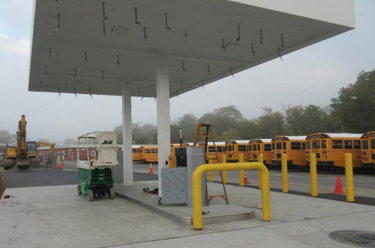As district gears up for next capital project, music ‘definitely needs love,’ says board
—Photo from from Oct. 3 presentation to the Guilderland School Board
A fuel island for school buses, now complete, was part of Guilderland’s $31 million capital project, passed in 2019. Now the state is requiring that new buses be electric starting in 2027 and, by 2035, all school buses must be zero-emissions.
GUILDERLAND — Expanded music facilities are likely to be part of Guilderland’s next capital project.
Several school board members spoke enthusiastically about filling that need when the board met on Oct. 3 although the next project has yet to be outlined.
The district ended up working on two projects simultaneously after voters had narrowly defeated — by 54 votes — a $43 million project in 2018.
A pared-down $31 million project passed the next year, and work for that is now “substantially complete,” according to Clifford Nooney, the district’s superintendent of building and grounds.
Meanwhile, work on a $22 million project, which voters passed in 2021, is “about halfway through” Nooney told the board on Oct. 3.
Julie Petti, president of the Guilderland Music Parents and Friends Association, wrote a letter to the board, which its president read out loud at Tuesday’s meeting, reiterating the concerns students and parents had raised in March.
Petti had told the board on March 28 that close to 350 students participate in high school ensembles supported by “almost 1,000 proud parents.” She noted that music is a curricular subject and any student can participate.
Her letter reiterated those two points along with three others: the space shortage reduces instructional time as instruments have to be moved and set up; sharing the auditorium hurts learning for music as well as drama students; and both instruments and people can be hurt as instruments are moved.
“It really needs our assistance,” said board member Gloria Towle-Hilt of the music program, calling board attention “long overdue.”
Board member Blanca Gonzalez-Parker, who toured the high school music facilities this summer along with other board members, said, “It was like cold water to the face.” She praised the success of the music program despite its limited space and said, “I think it definitely needs love.”
Board President Seema Rivera said she hadn’t realized earlier that everything had to be taken on and off the high school auditorium stage.
Board member Katie DiPierro commented on the limited space for lessons.
“It’s across all spaces,” said Gonzalez-Parker. “My 9-to-5 job involves worksite safety. And one thing that really struck me was the potential for injury during the moving and the shuffling.” She also noted the band’s conductor was precariously close to the edge of the stage.
Rivera suggested that a member of Petti’s organization attend meetings of the board’s business practices committee to lend that perspective. While Nooney didn’t disagree, he thought that the committee should first have preliminary discussions.
Nooney highlighted some of the accomplishments of the earlier capital projects including a new fuel island and bus lifts, window replacements, better gym floors, an improved public-address system that is tied in the fire alarms and phones as part of security measures, ventilation, paving, and Promethean boards in classrooms.
“Every boiler in our school buildings has been replaced within the last three capital projects,” said Nooney. Just one boiler now needs to be replaced, for the transportation department, he said.
Nooney also said that the new playing field of plastic grass “was a lifesaver this year.”
He noted that, with all the rain, there is still a field at Farnsworth Middle School that has not been mowed and painted. “We’re getting our money’s worth out of our turf field,” he said.
Three schools have their outdoor pavilions nearly complete, Nooney said. When asked about furniture, he said, “We have to trust people” not to steal it. The pavilions, he said, are well lit and have security cameras; bolting the furniture in place would defeat the flexibility needed to use the pavilions in different ways, Nooney said.
Several board members raised concerns about meeting state requirements for electric school buses; new buses have to be electric starting in 2027 and, by 2035, all school buses must be zero-emissions.
Gonzalez-Parker raised worried about batteries burning, and Superintendent Marie Wiles mentioned issues being raised about batteries not holding enough charge to cover rural routes
Board member Katie DiPierro asked if more training would be needed for mechanics. The state was clear that no one was to lose their job because of the transition, responded Assistant Superintendent for Business Andrew Van Alstyne.
“We have to do a workforce study as part of our preparation,” he said.
Van Alstyne said that the New York State Energy Research and Development Authority had released “a roadmap that doesn’t have a lot of detail.”
He also said the state this year is deciding how to allocate the $500 million that was in the Environmental Bond Act for electric school buses.
“As of now,” Van Alstyne said, “school districts are supposed to report their status for next year on what they’ve acquired, any studies they’ve done, and capacity.”
He noted that infrastructure to charge electric buses will be needed as well as the buses themselves.
“They put a roadmap out that was just for potholes, in my opinion,” said Nooney, “because half the stuff wasn’t even filled in yet. You know, they put out all these guidance documents with no guidance.”
Rivera said she didn’t want advocating for more music space “to get lost in this bigger discussion about the buses.”
“It would not be lost,” responded Nooney, noting that he had recommended “starting with educational programming first.”
Nooney urged the board “to stay on track” with a capital project every five years. He noted the “hiccup” with the bond defeat, which caused two projects to be underway at the same time.
“Depending on the business practices committee and the board, we would actually start our work this winter,” Nooney said of discussing educational programming to be amplified in the next capital project.
“What do we want this district to look like to be ready for the future?” he asked.



